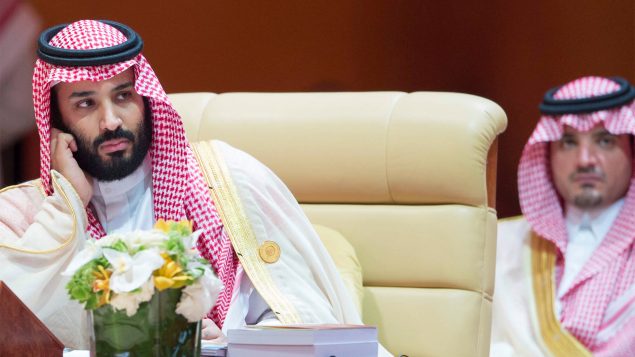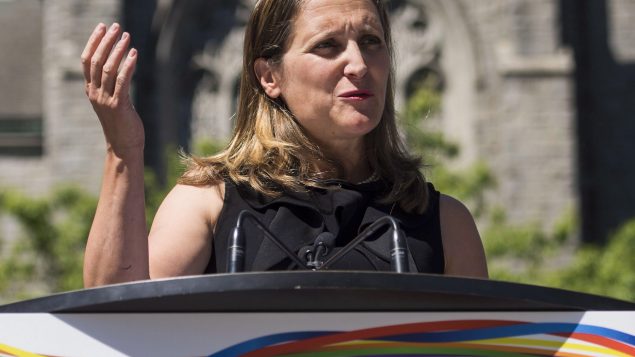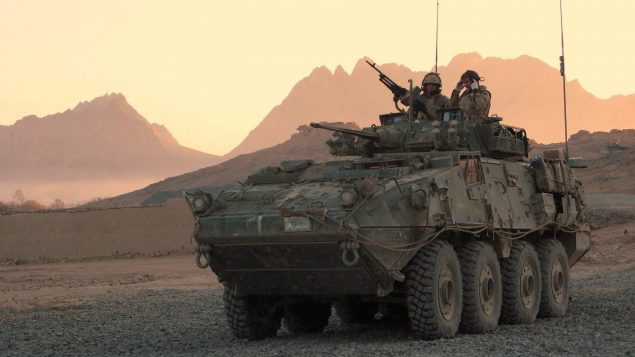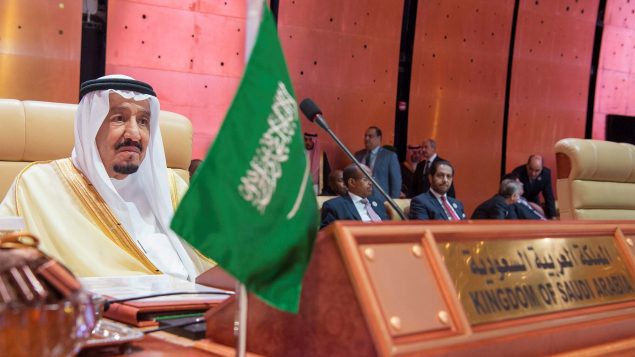The diplomatic spat between Riyadh and Ottawa showed no signs of easing Tuesday as Saudi Arabia’s two most powerful leaders reiterated their “absolute rejection of the negative and surprising position of the Canadian government” on detained Saudi civil society activists.
The official Saudi Press Agency reported Tuesday that Saudi Arabia’s King Salman bin Abdulaziz chaired a cabinet meeting with Crown Prince Mohammed bin Salman where the latest diplomatic row with Canada was discussed.
“The Cabinet reviewed a number of reports on events and latest developments in the region and the world, renewing the Kingdom’s absolute rejection of the negative and surprising position of the Canadian government, which has not been based on any correct information or facts about what it called the civil society activists who have been detained by the competent authority,” the state news agency reported.
‘Blatant interference’

Saudi Arabia’s Crown Prince Mohammed bin Salman attends a meeting during the 29th Arab Summit in Dhahran, Saudi Arabia April 15, 2018. (Bandar Algaloud/Courtesy of Saudi Royal Court/Handout via REUTERS)
Saudi Arabia expelled Canada’s ambassador in Riyadh on Sunday over what officials called “blatant interference in the Kingdom’s domestic affairs.”
Ambassador Dennis Horak was declared a persona non grata and was given 24 hours to leave the country, the Saudi Foreign Affairs Ministry said in a harshly-worded statement.
Saudi Arabia is also recalling its ambassador in Ottawa and halting all new investment and trade transactions with Canada, the ministry added.
Saudi-owned news channel Al-Arabiya has reported that the kingdom’s education ministry has suspended all training, scholarships and fellowships to Canada and is working on the transfer over 15,000 Saudi students from Canada to other countries.
And Saudi Arabian Airlines announced Monday that they will be suspending all flights to and from Toronto as of Monday, Aug. 13.
Activists arrested

U.S. Secretary of State Hillary Clinton and First lady Michelle Obama (L) congratulate Samar Badawi of Saudi Arabia during the State Department’s 2012 International Women of Courage Award winners ceremony in Washington March 8, 2012. Badawi has been detained by Saudi authorities Amnesty International reported. (Gary Cameron/REUTERS)
The moves came after Foreign Affairs Minister Chrystia Freeland tweeted Thursday that Canada was “very alarmed” to learn Saudi authorities have arrested Samar Badawi, the sister of jailed Saudi blogger Raif Badawi, along with prominent activist Nassima al-Sada.
“Canada stands together with the Badawi family in this difficult time, and we continue to strongly call for the release of both Raif and Samar Badawi,” she tweeted.
The Saudi government insisted Tuesday that Badawi and al-Sada were detained by the office of the public prosecution “on charges of committing crimes necessitating their detention in accordance with regular procedures that guaranteed their legal rights and provided them with all guarantees during investigation and trial stages.”
The Saudi royals also stressed Riyadh’s “commitment to international conventions, principles and norms that respect the sovereignty of each state and non-interference in its internal affairs being governed by its constitution, rights and legal regulations and procedures,” the press agency reported.
Foreign policy driven by Canadian values?

Foreign Affairs Minister Chrystia Freeland speaks at a press conference in Vancouver, B.C. on Monday, August 6, 2018. (Jimmy Jeong/THE CANADIAN PRESS)
The Saudi cabinet meeting in NEOM, a futuristic city being developed in the northwest of the kingdom, came a day after Freeland unapologetically stood her ground.
“I will say Canada is very comfortable with our position. We are always going to speak up for human rights; we’re always going to speak up for women’s rights; and that is not going to change,” Freeland told a news conference in Vancouver on Monday.
“Canadians expect our foreign policy to be driven by and to embody Canadian values, and that is how we intend to continue our foreign policy.”
Raif Badawi’s wife, Ensaf Haidar, has lived in Quebec with the couple’s three children since 2013. They became Canadian citizens earlier this summer.
“Ensaf is a Canadian citizen,” Freeland said. “She and her family, therefore, merit special attention from the government of Canada and a lot of Canadian civil society has been speaking up for her.”
No word on LAV deal

A Canadian LAV (light armoured vehicle) arrives to escort a convoy at a forward operating base near Panjwaii, Afghanistan at sunrise on Nov.26, 2006. (Bill Graveland/THE CANADIAN PRESS)
Freeland said the government was still waiting for more information about the specifics of how the Saudi sanctions would impact ongoing trade agreements between the two countries.
It’s still unclear whether the latest tiff between Riyadh and Ottawa will affect the deal to sell $15 billion worth of Canadian-produced advanced light armoured vehicles to Saudi Arabia.
The Liberal government approved the controversial deal signed under the previous Conservative government in 2016, despite calls from civil society groups to scrap it because of concerns the armaments could be used to commit human rights violations domestically or during the Saudi-led operation to prop-up the internationally recognized government of Yemen.
However, Prime Minister Justin Trudeau has yet to comment on Saudi Arabia’s sanctions.
Sending message to others
Bessma Momani, an analyst on Middle East affairs and professor at the University of Waterloo, told CBC News the move resonates positively among Saudis, but also among the country’s allies in the region.
Momani called it “getting tough on Canada,” which she said other countries in the region might welcome if they view Canadian foreign policy to be led by human rights concerns.
Thomas Juneau, a professor at the University of Ottawa, said the Saudi policy also sends a message to other Western countries that they shouldn’t “mess” with Saudi Arabia.
“For Saudi Arabia to punish Canada, it’s fairly easy because we’re not an important country for them, either are they for us,” Juneau said.
No help from Canada’s allies
Saudi Arabia has garnered support from regional allies the United Arab Emirates, Bahrain, the Palestinian Authority, and tiny Djibouti, as well as the Organization of Islamic Cooperation (OIC).
Ottawa, on the other hand, has yet to receive public backing from its Western allies. The European Union seems to be staying away from the political minefield the Ottawa-Riyadh row presents.
Even the United States, Canada’s closest ally and partner, issued a very neutral statement, saying “Canada and Saudi Arabia are both close allies of the United States.”
The fact that the U.S. chose to put Canada, with which it shares membership in NATO and the binational North American Aerospace Defence Command (NORAD), and Saudi Arabia on the same footing did not go unnoticed.
“Canada has no backing at all from the U.S. in its current spat with Saudi,” Juneau tweeted Tuesday.
While the “spectacular” dispute between Ottawa and Riyadh is “ultimately not very important,” the U.S. reaction should give Canadian officials pause, he said.
“This should be a source of major anxiety: when a real crisis comes, and we are alone, what do we do,” Juneau tweeted.
With files from CBC News







For reasons beyond our control, and for an undetermined period of time, our comment section is now closed. However, our social networks remain open to your contributions.